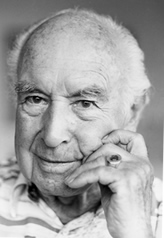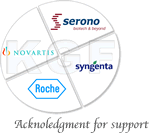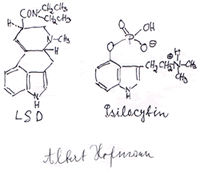
Albert Hofmann
The committee has awarded this years Hofmann Award to Professor Christopher Chang.
Award 2015
Albert Hofmann (1906 - 2008)
Albert Hofmann Dies at Age 102
Dr. Dr. h.c. mult. Albert Hofmann – most famous for his discovery of LSD – died from a heart
attack on Tuesday, April 28 at his home in Burg im Leimental at the age of 102.
Dr. Albert Hofmann is accepted to be one of the most important chemists of our time. He is most
famous for the synthesis of psychoactive substances – culminated by LSD the most prominent of
his discoveries. This "problem child" of Hofmann influenced a large portion of his career and
thinking and through the studies on LSD, Hofmann unlocked many other mysteries of psychoactive
compounds used in tribal medicinal and religious rites. These discoveries revolutionized our
perspective on how chemicals affect cognitive function, which in turn opened new vistas for
cognitive and psychological sciences in general. Nonetheless, discussions of abuse of LSD often
overshadow his other achievements as seen by the general public.
Albert Hofmann was born in Baden (1906) as the eldest of the four children of a toolmaker. When
his father fell ill, Albert had to support his family and therefore undertook a commercial apprenticeship.
At the same time he went on learning Latin and other languages and later succeeded to reach
the “Matura” in a private school paid for by an anonymous benefactor. He entered at age 20 just as
most students who have not gone through an apprenticeship.
In 1926 he started to study chemistry with Paul Karrer at the University of Zurich where he earned
his PhD with distinction after only four years. His thesis involved the elucidation of the sugar building
blocks of chitin (insect and lobster shell)
In 1929 he took a job with Sandoz Laboratories in Basel, where he stayed for more the four decades,
first attracted by a program that sought to synthesize pharmacological compounds from natural
products. He mainly worked there with fungi and medicinal plants, and succeeded to isolate many
basic compounds of the pharmaceutically essential ergot alkaloids. His basic research yielded
commercially important products like Hydergine (geriatric drug), Dihydergot (circulation- and
blood-pressure stabilizer), or Methergine (agent applied in gynecology). Hofmann latter became
head of the research department for natural medicines and stayed with Sandoz until his retirement in
1971.
Albert Hoffmann authored more than 100 scientific articles and a number of books. After his retirement
he was increasingly recognized for his pioneering work for which he earned several honorary
doctorates (ETH Zurich, Stockholm University, Berlin Free University).
On January 11, 2006, Albert Hofmann became centenarian. Several honorary events were organized
to celebrate his 100th birthday, the first Albert Hofmann Symposium of the MNF/UZH being one of
them (http://www.oci.unizh.ch/diversa/hofmannSymposium/A_Hofmann.html). Albert's presence
in mind, body and spirit at that event was an inspiration to all. At 100, he actively engaged each
speaker with questions as if he were only 20. His infectious smile and energy touched everyone
deeply, see: http://www.oci.unizh.ch/diversa/hofmannSymposium/doc/Albert_Hofmann.mov .
Albert will forever remain in our hearts a favored alumnus of UZH. We celebrate his life
achievement through the Albert-Hofmann-Centennial-Medal Lecture to be held in fall 2009.



